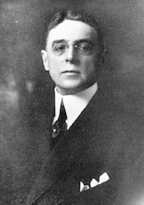Distinguished Faculty AwardJOHN ARCHER SILVER

JOHN ARCHER SILVER
Professor of History
1895-1916
John Archer Silver was born on August 4, 1863, at Churchville in Hartford County, Maryland. He prepared for college at York Collegiate Institute, York, Pennsylvania, and entered the sophomore class at Princeton University in September, 1883. He received the degree of Bachelor of Arts from Princeton in 1886, and that of Master of Arts in 1889. He taught in India for two years and then went to Europe to study theology, philosophy, and history at the Universities of Berlin, Heidelberg, and Paris. He followed this by an additional three years at Johns Hopkins where he studied history and philosophy and received a Doctor of Philosophy degree in 1895.
In September of 1895, Dr. Silver became the first Professor of History at Hobart College where he created a new department and also gave instruction in economics and political science. He taught these subjects and more at Hobart, and later at Hobart and William Smith, until his death at the age of 53 in 1916.
Outside the classroom, Dr. Silver took an active interest in all student activities. For years he ably filled the position of general manager and treasurer of the Athletic Association, and was also general manager of the Board of Control. It was partly to these offices that he owed his rare understanding of student life, but his intimate association with Hobart men was due to a genuine and spontaneous sympathy and interest. His home was always open to them, and his time was always theirs.
Professor Silver continued to travel to Europe during the summer breaks in the scholastic calendar, keeping current on political and economic developments on the continent. He was a frequent guest of the United States Ambassador to Austria, and was in Austria at the outbreak of the Great War. His lectures at the University Club and in his political science classes were heavily attended, marked as they were by both intimate personal knowledge and a firm grasp of the moral principles involved.
A student editorial at the time of his death said: “In our classrooms we shall no longer receive the inspiration of his grasp of historical subjects. To sit in classes under Dr. Silver was a liberal education. It developed the man as well as the mind. He is living on in the influence he has exerted over generations of Hobart men.”
The Hobart Herald article recounting his death also paid tribute with the following comments: “As an instructor Dr. Silver was considered one of the ablest men on Hobart’s faculty. He had a simple and direct method of imparting knowledge, which made his various courses, covering the entire field of history, both popular and profitable. He was respected, loved, and admired by every student in College both for his position on the faculty and among the students.”
